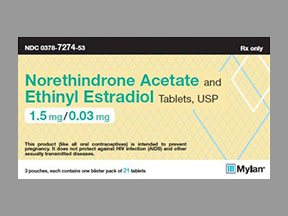Junel 1.5/30 is a limited distribution medication.

Junel 1.5/30 Coupons & Savings Card – Discount Prices from $13.40
Brand for: Norethindrone acet-ethinyl est
My prescription
Edit
1.5-30MG-MCG, Norethindrone Acet-ethinyl Est (21 Tablets)
Select pharmacy

CVS
$20.91
COUPON PRICE
Walmart
$13.40
COUPON PRICE
Walgreens
$13.53
COUPON PRICE
Albertsons
$14.06
COUPON PRICEJunel 1.5/30 savings card
Show this card to your pharmacist
Walmart
$13.40
BIN
ID
PCN
GRP
019876
LH18B7FC1B
CHIPPO
LHX
Powered by
Price history for Junel 1.5/30 (brand) & Norethindrone Acet-ethinyl Est (generic)
21 Tablets, 1.5-30MG-MCG
Average retail price for Junel 1.5/30
Average retail price for Norethindrone Acet-ethinyl Est
Average SaveHealth price for Norethindrone Acet-ethinyl Est
Our price history data is based on aggregated prescription data collected from participating pharmacies in America. Our prescription data updates daily to reflect the latest price changes. If you notice a missing data point, it means there wasn't sufficient data available to generate a monetary value for that date.
Over the last 12 months, the average discount price of Junel 1.5/30 is $18.63 using the SaveHealth savings card. That's an average savings of 37.15% on Junel 1.5/30 with our discount card.
*Retail prices are based on pharmacy claims data, and may not be accurate when we don't have enough claims.
Junel 1.5/30 (Norethindrone Acet-ethinyl Est) dosage forms
Dosage Quantity Price from Per unit 1.5-30MG-MCG 21 Tablets $13.40 $0.64 1.5-30MG-MCG 63 Tablets $26.13 $0.41
| Dosage | Quantity | Price from | Per unit |
|---|---|---|---|
| 1.5-30MG-MCG | 21 Tablets | $13.40 | $0.64 |
| 1.5-30MG-MCG | 63 Tablets | $26.13 | $0.41 |
Does Junel 1.5-30 cause weight gain?
Junel 1.5/30, like other combination oral contraceptives, may cause weight gain in some individuals. However, weight gain is not a guaranteed side effect and can vary from person to person. If there are concerns about weight changes while taking Junel 1.5/30, it is advisable to discuss them with a healthcare provider.
What are the side effects of junel Fe 1.5 mg 30 mcg?
Junel Fe 1.5 mg/30 mcg, a combination oral contraceptive, may cause several side effects. Common side effects include nausea, vomiting, headache, bloating, breast tenderness, and changes in weight or appetite. Some individuals may experience mood changes, spotting between periods, or changes in menstrual flow. Serious side effects, though less common, can include blood clots, high blood pressure, liver problems, and an increased risk of certain cancers. It is important to consult a healthcare provider if any severe or concerning symptoms occur.
When do you get your period on Junel?
When taking Junel, a combination oral contraceptive, the menstrual period typically occurs during the placebo week, which is the last week of the pill pack. This is when the user takes the inactive pills, allowing for withdrawal bleeding that resembles a menstrual period. However, the timing and flow can vary for each individual.
What are the side effects of junel birth control 1.5 30?
Junel 1.5/30, like other birth control pills, may cause side effects. Common side effects include nausea, vomiting, headache, bloating, breast tenderness, and changes in weight or appetite. Some individuals may experience mood changes, spotting between periods, or changes in menstrual flow. Serious side effects, though less common, can include blood clots, high blood pressure, and liver problems. It's important for individuals to discuss any concerns or unusual symptoms with their healthcare provider.
Can Junel affect your mood?
Yes, Junel, which is a combination oral contraceptive, can affect mood. Some individuals may experience mood changes, including mood swings, depression, or anxiety, as a side effect. It is important for individuals to monitor their mood and discuss any significant changes with their healthcare provider.
